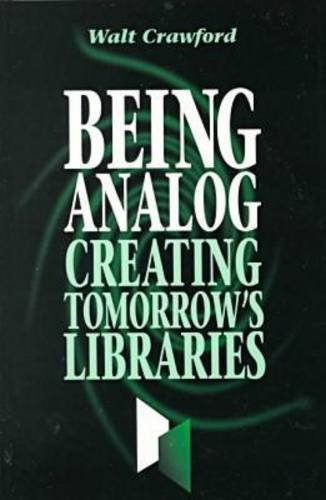Synopsis
Walt Crawford, coauthor of Future Libraries: Dreams, Madness, & Reality, offers an alternative model to a simplistic digital future in Being Analog: Creating Tomorrow's Libraries. The always outspoken Crawford challenges popular prognostications, asserting that the complex mix of technologies projects no clear path to the future and that people use technology in unexpected ways. In today's competitive funding environment, digital dreams of virtual libraries pose the real threat of misguided physical and budgetary planning. Crawford's cogent arguments will help you articulate your own viewpoint to administrators, staff, or users who claim that the virtual library will do it all for less. He explores the roles of libraries and the reasons people use libraries. He helps you make choices among the ever shifting, complex combinations of digital and analog resources. Being Analog celebrates the remarkable results professional librarianship has achieved in sensibly combining human intelligence and computer power. It points the way to a real world where flexible libraries support today's services and resources while accommodating tomorrow's changes.
Reviews
Because of my tremendous respect for Crawford, Access Services Officer of the Research Libraries Group, I read and reread Being Analog to see if the problem with it is me. Maybe it is, but I couldn't figure out for whom the book is written or why. It is a collection of vintage Crawford, so well aged that much of it was already dated when he first thought, said, or wrote it. You will recognize the Crawford voice, the warning, and even many of the villains. These are not exactly "straw targets" as Walt takes great pains to point out, but surely they are rare enemies of libraries, singled out to give the author targets for his attack on a kind of technovision that very few professionals hold anymore, indeed that very few ever did believe. It is the "digital dreamers" who fake "hardnosed practicality" and "those who still write about digital libraries as replacements for mixed libraries" whom Crawford attacks. I doubt any exist in the extreme terms he uses for them, although he did find one to name in the text and in the ten-item bibliography (three by Crawford). It is hard to believe, for example, that anyone is really so dumb that he can be described thus: "They don't read books, so books are dead.... They circulate preprint journal articles and consider magazines beneath contempt...." Oh, sure, there's some good stuff. I like many of Crawford's arguments, like those against Internet filters, but nearly all have been exhausted through heavy use, or are so basic as to already be among "the givens" of librarianship. Crawford says it all in straightforward, popular language. It is exhortative stuff, presuming such low levels of understanding that it is sometimes downright condescending. Most disappointing, the book fails to define or specify the problems it wants to solve, the enemies it wants to vanquish, or the future it wants to shape. After the second reading, I began to think that those problems, enemies, and futures all had an uncanny resemblance to windmills.AJohn Berry, "Library Journal"
Copyright 1999 Reed Business Information, Inc.
"About this title" may belong to another edition of this title.
